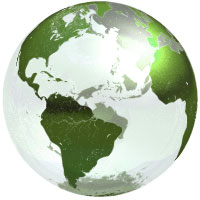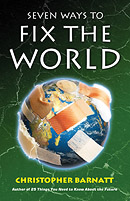 |
|
|
|
You are in: Future Trends : Low Energy Lifestyles
Low Energy Lifestyles
Since the Industrial Revolution, humanity has become addicted to artificial energy supplies, and in particular to the consumption of the 'liquid gold' of petroleum. Unfortunately, with Peak Oil looming, and due to measures to try and limit climate change, the days of our fossil-fuel-focussed economy have to be coming to an end. The good news is that investments in wind, wave and solar power are growing exponentially. Even so, over the next couple of decades, most people in developed nations will have to learn to use significantly less energy. Beyond making a transition from fossil fuels, the big problem we face is that no known form of alternative energy supply can provide the 'net energy' yield of fossil fuels. 'Net energy' is a measure of the energy obtained from an energy source after the energy (and related resources) consumed in its production have been accounted for. Most commonly, those who analyze net energy work with a measure known as 'EROI' or the 'energy return on investment'. Back in the 1930s, many forms of petroleum freely gushed from a well, and had an EROI value of around 100:1. Today, most of this very 'sweet' petroleum has already been exhausted, with the global EROI of petroleum having fallen to a typical 40:1. This is, however, still far higher than the EROI value for those energy sources on which we are likely to have to rely in the future. For example, biofuels have a typical EROI of 3:1, while non-conventional oil (extracted from oil sands or shale) has an EROI of between about 5:1 and 7:1. Wind power has a maximum EROI of up to about 18:1 and often far less (turbines do not last forever!), while photovoltaic (PV) solar power yields an EROI of about 7:1. EROI values are very difficult to establish and are hence hotly debated in many quarters. However, there is little disagreement that (a) the EROI of petroleum is falling and will continue to fall, and that (b) the EROI of all likely, large-scale alternative energy sources is far lower than that of petroleum. With this 'net energy time bomb' now ticking, we will therefore all have no choice but to transition to lower energy lifestyles over the coming decades. This is simply because, while alternative energy sources will be able to fuel the world of tomorrow, they will not be able to power a clone of today. Our pending "net energy time bomb" is summarized in this video: Making the TransitionOur transition to lower energy lifestyles is likely to involve a great many measures. For a start, most people will need to become far more energy aware, to reduce waste, and to start taking more responsibility for their energy use. We will also need to develop and adopt many low-power devices, and indeed to stop using powered machines for some purposes. (How many of us, after all, really need an electric air freshner?!). Some people may also choose to go 'off-grid' to generate at least a little of their own energy at home. This could involve the roll-out of all manner of technologies from rooftop solar panels and wind turbines, to ground source heat pumps and anaerobic digestors. More local living may also help considerably, with the consumption of local food and other goods reducing our requirement to use energy to transport so many things over such long distances. Today, some communities are already rising to the challenge of developing more locally-centric, more power efficient ways of living. Perhaps most notably, the Transition Network (also known as the Transition Movement) is comprised of over 1,000 local, regional or national 'transition initiatives' across 35 countries. Each of these is 'dedicated to the creation of tangible, clearly expressed and practical visions' for moving its community beyond fossil fuel dependence. Transition Initiatives are therefore developing their own 'energy descent plans' (EDPs) as 20 year routemaps to help their communities develop the lower energy lifestyles that we will all have to live in the realtively near future. You can find our more via TransitionNetwork.org. This topic is discussed in far more depth in my book Seven Ways to Fix the World. Return to Future Trends.
|
 Alternative energy sources may be able to fuel the world of tomorrow. But they will not be able to power a clone of today.  Read more in this book |
|
|